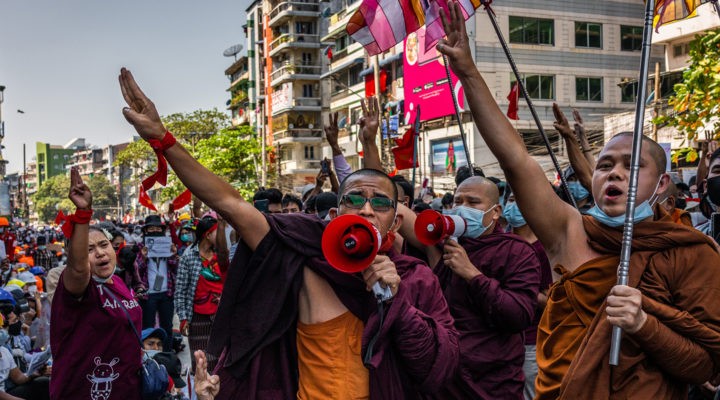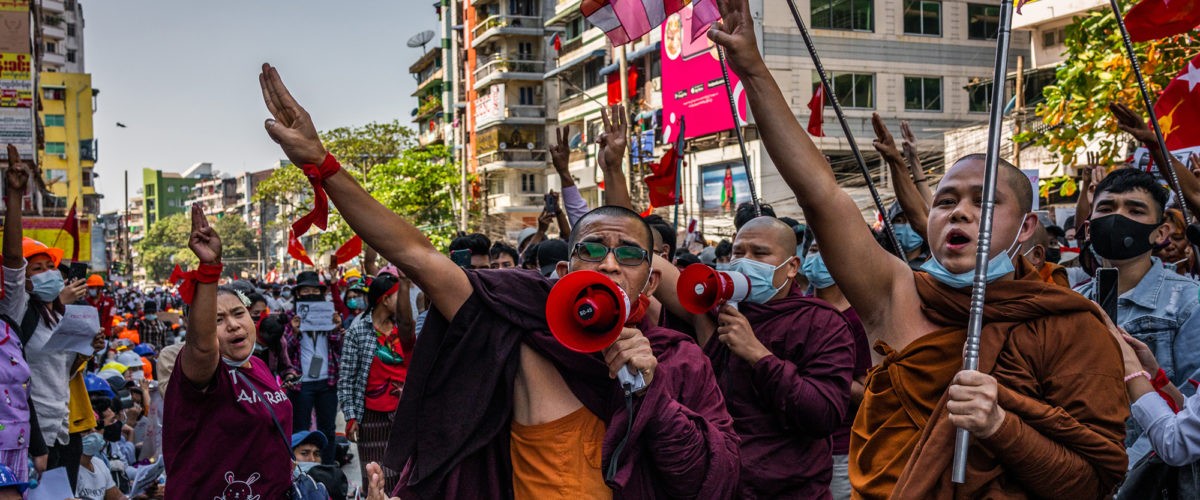People and organizations of faith encountered less overall resentment and mistreatment globally in 2019 than in the previous decade, according to Pew’s 12th annual survey on global restrictions of religion.
The research found that 43 countries (22% of all those included in the study) had “high” or “very high” levels of social hostilities. That number is down from 53 countries reporting high hostility in 2018, and from a peak of 65 countries reporting the same in 2012.
The new report on 2019 data provides the most current view of this global question.
While the figures have wavered since the study was launched in 2007, the number of nations experiencing “high” levels of social hostility toward religion currently are the lowest since 2009, the survey found.
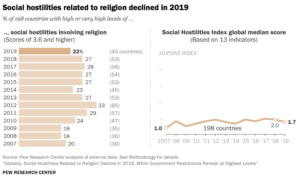 “Another way of looking at the data is by examining scores on the Social Hostilities Index, a 10-point scale based on 13 indicators of social hostilities involving religion,” Pew noted. “The global median score declined from 2.0 in 2018 to 1.7 in 2019, reaching its lowest level since 2014.”
“Another way of looking at the data is by examining scores on the Social Hostilities Index, a 10-point scale based on 13 indicators of social hostilities involving religion,” Pew noted. “The global median score declined from 2.0 in 2018 to 1.7 in 2019, reaching its lowest level since 2014.”
Other key findings include a decline in countries experiencing religion-related terrorist activity but also a large number of countries living with government controls on faith.
Globally, the survey found that “a record low” 49 nations saw at least one type of religiously motivated terrorist activity in 2019, including detentions, displacements, property destruction, recruitment and fundraising.
“That was down from 64 countries in 2018, and from a record high of 82 countries in 2014,” Pew reported. “The decline from 2018 occurred in four of the five regions analyzed: the Americas, the Asia-Pacific region, Europe and the Middle East-North Africa region. Only in sub-Saharan Africa did the number of countries with religion-related terrorism remain stable in 2019.”
The study also found a decline in deaths and injuries caused by religion-related terrorism: “In 2019, 47 countries had at least one casualty due to religion-related terrorism, down from 57 countries in 2018.”
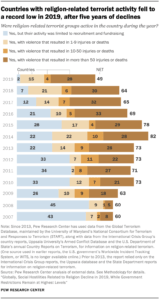 The trend mirrors a wider decline in terrorist activity from 2014 to 2019 reported by the Global Terrorism Database. In large part, that decline is attributed to territorial losses by the ISIS terrorist group in Iraq and Syria. (The latest data predates the Taliban retaking control of Afghanistan this year.)
The trend mirrors a wider decline in terrorist activity from 2014 to 2019 reported by the Global Terrorism Database. In large part, that decline is attributed to territorial losses by the ISIS terrorist group in Iraq and Syria. (The latest data predates the Taliban retaking control of Afghanistan this year.)
“In 2019, the Global Coalition to Defeat ISIS declared that the militant group had been territorially defeated,” Pew noted. “And the number of violent attacks perpetrated by the group declined in Iraq in 2019, according to the Global Terrorism Database.”
Some forms of religion-related social hostility also declined in 2019.
“For example, there were fewer countries with reports of mob violence related to religion (down from 41 countries in 2018 to 34 in 2019), hostilities over proselytizing (from 35 in 2018 to 28 in 2019), organized groups using force or coercion in an attempt to dominate public life with their perspectives on religion (104 to 94 countries), and individuals using violence or the threat of violence to enforce religious norms (85 to 74 countries).”
Pew cited the 2018 expulsion of clergy and missionaries from rural areas of Bolivia dominated by indigenous spiritual traditions. No such actions were reported in 2019.
“And in Egypt, where social hostilities fell from ‘very high’ to ‘high’ in 2019, anti-Christian attacks (such as those against the Coptic Christian minority) and violence by Islamist groups declined, according to the U.S. Commission on International Religious Freedom. Although violence toward Christians continued in the country, there were fewer abductions and displacements reported in 2019.”
But government restrictions of faith groups remains an area of concern.
“The analysis shows that government restrictions involving religion, which in 2018 had reached the highest point since the start of the study, remained at a similar level in 2019,” Pew reported. “The global median score on the Government Restrictions Index, a 10-point index based on 20 indicators, held steady at 2.9. This score has risen markedly since 2007, the first year of the study, when it was 1.8.”
The number of nations where “high” or “very high” levels of such restrictions occurred increased to 57 in 2019 — an increase of one country from the previous year and the highest mark since 2012.
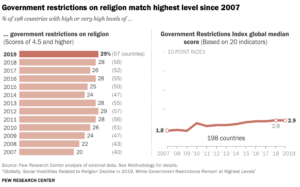 The survey also uncovered increases in government harassment against religious organizations and interference with worship freedoms, Pew said. “More countries had at least one reported incident of government harassment or interference in worship in 2019 than in any other year since the study began in 2007.”
The survey also uncovered increases in government harassment against religious organizations and interference with worship freedoms, Pew said. “More countries had at least one reported incident of government harassment or interference in worship in 2019 than in any other year since the study began in 2007.”
Cases of such harassment occurred in every area of the world, Pew said. “In Tajikistan, for example, authorities in 2019 detained 17 Jehovah’s Witnesses — a group whose activities are banned in the country — for ‘possessing religious materials and participating in religious activities.’”
Worship was the target of government restrictions in 82% of the nations surveyed, Pew said. Such interference included “prohibiting certain religious practices, withholding access to places of worship or denying permits for religious activities or buildings. In 2018, 156 countries interfered in worship in any of these ways.”
Related articles:
At this conference, religious minorities told each other’s stories of persecution
Global study finds when religion seeks political dominance, the faith suffers

